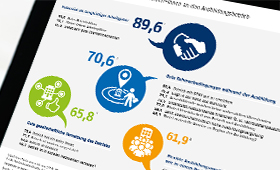Security and good working conditions rather than a smartphone
Young people’s preferences regarding their company providing training
31/2017 | Bonn, 22.08.2017

In overall terms, young people take a conservative view when it comes to their preferences regarding a future company providing training. Their first priority is the potential offered by the company as a long-term employer. This is mainly revealed via a positive working environment and good chances of gaining a secure job by being taken on permanently after training is completed. These are some of the results to emerge from a written representative survey of around 2,000 training place applicants conducted at the end of 2016 by the Federal Institute for Vocational Education and Training (BIBB) and the Federal Employment Agency (BA).
The young people and young adults also attach considerable significance to favourable general conditions during training. This includes aspects such as easy accessibility to the company. It is also highly important that a company should have a good image. According to the BIBB authors, this leads the young people to conclude that training conditions are also likely to be good. Trainees also wish to benefit from their company’s image within their own social environment. By way of contrast, material incentives such as receiving a smartphone as an introductory gift play only a subordinate role.
The young people responding to the survey also set comparatively little store by characteristics mainly found at major companies. These include flexible working times, additional provision extending beyond training, and the opportunity to learn together with a large number of other trainees. The results are somewhat different if only applicants in possession of a higher education entrance qualification are taken into account. The preference for training at a large company is more distinct within this group.
The situation on the training market also exerts a significant influence. If young people have high prospects of securing a training place because the market in their region is relatively easy or they are able to offer good school leaving qualifications and certificates, they also place more requirements on the companies. The young people are clearly aware that such circumstances mean that they have a wider choice and are also therefore in a position to demand more.
With regard to the results of the survey, BIBB President Friedrich Hubert Esser is of the view that small and medium-sized companies, which suffer most severely from the shortage of skilled workers, are particularly likely to rely on a good working atmosphere and high chances of permanent employment and to emphasise these aspects in their public relations work. “This increases their real chances of being seen as attractive employers in the competition with large companies.”
The results of the BIBB analysis have been published in the current edition of the BIBB Journal “Vocational Education and Training in Research and Practice” (BWP) Issue 4/2017 under the title of “Are young people with a strong market position more demanding in their career choice?” (available at http://www.bibb.de/bwp-4-2017). The article may be downloaded free of charge at http://www.bibb.de/bwp-8386 (in German only).
Specimen copy requested if printed.